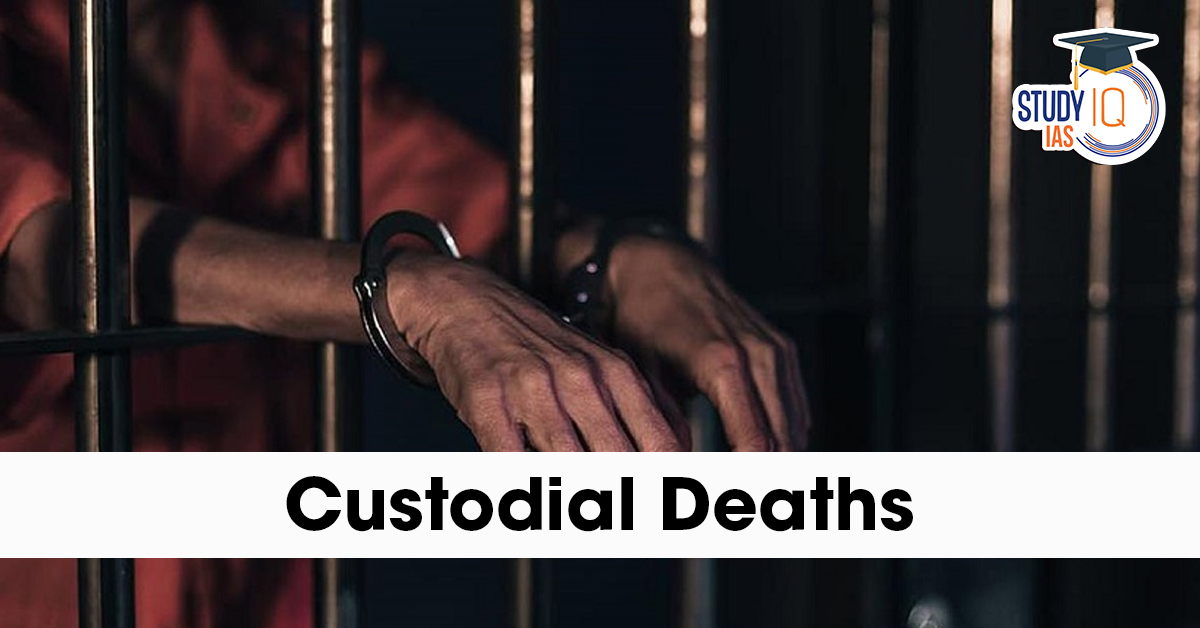Table of Contents
Context: Custodial deaths in Tamil Nadu highlight the urgent need for human-centric policing reforms and legislative safeguards across India.
What are Custodial Deaths?
Custodial death is the death of a person while in the custody of law enforcement authorities (police) or in a penal institution (judicial custody/jail). It is regarded as one of the most serious human rights abuses in a democratic nation, given that the state has to ensure the safety and welfare of persons in its custody.
Types of Custodial Deaths
Custodial deaths could broadly be classified as:
- Deaths in Police Custody: Arise when an individual is taken into police custody for interrogation, investigation, or temporary detention in a police lock-up. These are usually very controversial because of suspicion of torture or ill-treatment.
- Deaths in Judicial Custody/Prison: Take place when an individual is in prison, as an undertrial prisoner (waiting for trial) or as a convicted prisoner serving a term. While some of these occur naturally (disease, aging), many more are caused by neglect, denial of medical care, violence from other prisoners or jail officials, or even duress suicides.
Issues Behind Custodial Deaths
- Normalisation of Violence: Use of force is routine, with torture seen as an investigative shortcut.
- Eg., Ajith Kumar (2025) suffered 44 injuries and torture in custody; Vignesh (2022) died with multiple injuries hours after detention.
- Neglect of Mental Health: Minimal investment in officers’ psychological care leads to burnout and aggression.
- Poor Training: Outdated training ignores ethics, human rights, and trauma-informed policing.
- Lack of Accountability: Perpetrators are rarely prosecuted; suspensions are superficial.
- Eg., after the death of Raja (2024), only minor suspensions occurred; no convictions in many high-profile custodial deaths (e.g., Jayaraj-Bennicks, 2020).
- Inadequate Oversight: CCTV systems are non-operational or tampered with; real-time monitoring is lacking.
- Weak Legal Framework: No comprehensive anti-custodial violence law with time-bound investigations.
Reforms to Undertake
- Budget Reallocation: Allocate a portion of the policing budget (e.g., 5%) for district-level mental health units and mandatory counselling, similar to Kerala Police’s mental health support programs.
- Modernise Training: Include ethics, human rights, community policing, and trauma management.
- Legislative Action: Enact a strong anti-custodial violence law, inspired by the Prevention of Torture Bill (yet to be passed in India), and as recommended by the Law Commission 273rd Report (2017).
- Strengthen Oversight: Ensure tamper-proof, real-time CCTV monitoring, as mandated by Supreme Court in the Paramvir Singh Saini case (2020).
- Accountability Mechanisms: Implement time-bound, independent investigations into custodial deaths.
- Institutionalise Mental Wellness: Mandate regular psychological assessments and quarterly counselling for officers, as piloted in Bengaluru City Police.


 Particularly Vulnerable Tribal Groups (P...
Particularly Vulnerable Tribal Groups (P...
 Geo-tagging of Buildings During Upcoming...
Geo-tagging of Buildings During Upcoming...
 Gender Gap in Educational Expenditure in...
Gender Gap in Educational Expenditure in...

























